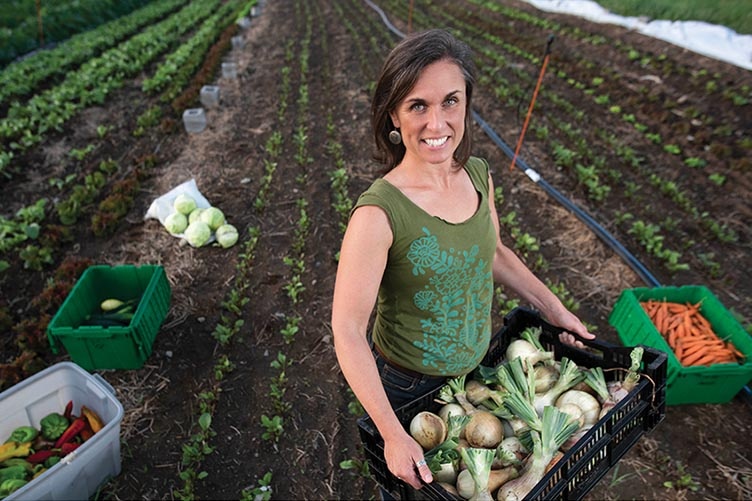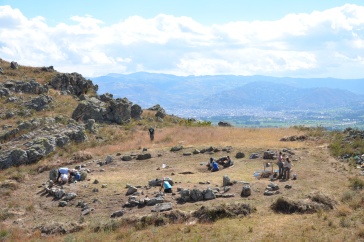
Photo Credit: MICHELE STAPLETON
Megan Taft ’01 came to UNH from suburban Connecticut knowing what she didn’t want: a career in a cubicle. She immediately joined an outdoor education class for a week of backpacking in the White Mountains — even though she had never hiked a mountain before. The stretching set in motion her first week at UNH hasn’t stopped since.
Four years ago, Taft and her partner, Sara Cawthon, founded the nonprofit Twin Villages Foodbank Farm in the Midcoast Maine community of Damariscotta. This year they expect their 2 acres of no-till fields to yield 50,000 pounds of organic vegetables — carrots and beets, winter cabbage and onions, zucchini and lettuce — all of it distributed to the hungry through seven food pantries and five youth programs.
Six hundred farm members cover half the operating expenses by buying farm shares. Each year, 500 student and adult volunteers help Cawthon, the farm manager, and her assistant, Kaitlyn Gardner, work the fields. Taft handles community outreach and fundraising; she holds a full-time job with the statewide Good Shepherd Food Bank, too.
“It’s hard work,” Taft says. “But it’s work we do from our hearts, so we just kind of put ourselves into it — full heart, full body. ... When I drive over that hill some mornings and I see Sara and Kaitlyn out here with a volunteer crew — it just elicits such a visceral response of this is what it was meant to be. It was meant to be a place where people can come together.”
Taft graduated from UNH with a degree in outdoor education. Her interest in food and social justice began to take root on a trip to Guatemala her senior year, where she and classmates lived in a rural village for about 10 days.
Following graduation Taft took a job working with middle school students at a nonprofit in Maine. Cawthon worked there too. Now married, they have a 5-year-old child, Adley. They first ran a farm together in Wisconsin, where they had moved to be closer to Cawthon’s family.
Maine and its “really tight sense of people in relationship” called them back.
Their Twin Villages farm encompasses a barn and six fields on what was for many years a dairy farm, now owned by the Coastal Rivers Conservation Trust. The land rolls and dips toward the Great Salt Bay; thick stands of trees rise along ridges and cover the hills. The trust is an essential partner, making land available at no cost, serving as their fiscal agent and helping with marketing and fundraising.
Foundation support covers the bills that individual donors can’t while also supporting infrastructure improvements — most notably “The Hub.” There, in the renovated barn basement of another Coastal Rivers Trust property, Twin Villages stores produce in a large walk-in cooler that Gardner built. The space also provides storage and a distribution center for area food pantries.
In time, Taft and Cawthon hope to produce 100,000 pounds of vegetables on 3 acres. Already they’re fielding questions from others interested in creating farms like Twin Villages in their communities.
Maine is the hungriest state in New England, the ninth hungriest in the country. Addressing that will require systemic change, Taft says, which she hopes to help bring about in part by working with those experiencing food insecurity to share their stories with people in power.
Her motivation rises from being a parent herself, one who has been privileged to meet her child’s needs. That makes the thought of parents having to put their children to bed without a meal difficult to accept. “Nobody should have to do that,” she says, with a catch in her throat. “Right?”
-
Written By:
Mark Travis | Freelance Writer
















































